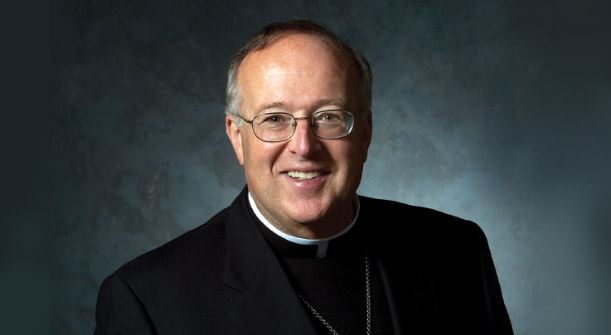On April 15, Bishop Robert W. McElroy will be formally installed as the sixth Bishop of the Diocese of San Diego. Bishop McElroy graduated from Harvard University in 1975, earned his master’s degree in American history from Stanford University in 1976, and went on to earn a licentiate in theology from Jesuit School of Theology at Berkeley, a doctorate in moral theology from the Gregorian University in Rome, and a doctorate in political science from Stanford University. He is the author of two highly regarded books as well as numerous articles for an educated lay audience, including articles about politics, public theology, and foreign policy that have been published in the Jesuit weekly, America Magazine. As a Catholic theologian and faculty member at the University of San Diego, San Diego’s only Catholic Changemaker university, I offer my congratulations and warm welcome to Bishop McElroy. I extend this word of welcome:
A Word of Welcome to Our New Bishop
Welcome to San Diego, Bishop McElroy. As you begin to learn your way around, be sure to enjoy the weather, the beautiful sunsets, our local craft beer culture, and perhaps even a Padres game at Petco Park. But in the midst of this natural beauty and tourist destination-enjoyment, you may begin to notice also the ways that our community is in need of moral guidance and pastoral care. In particular, these four issues are in need of deeper engagement and evangelization:
- Inequality
14% of San Diego residents live below the federal poverty line and many more struggle to find affordable housing, child care, and employment with a living wage. According to one study, 22% of San Diego residents live in ‘real poverty,’ living below the adjusted poverty threshold. More than 2,000 homeless youth sleep on our streets each night. San Diego is known for pristine beaches, multi-million dollar ocean view mansions, and perfect weather. You’ve written about the “scandal of economic inequality,” arguing that “grave inequalities within and among nations are automatically suspect in Catholic thinking and constitute not the legitimate natural order but a profound violation of that order”.
Your pastoral efforts to recognize the equal dignity of every person in our community, no matter what, will go a long way toward making San Diego known for its commitment to social justice, not just its beaches and weather.
- Immigration
A mere 25 miles from the Diocese of San Diego Pastoral Center is the U.S. –Mexico border. The San Ysidro Port of Entry is the busiest land border crossing in the world, processing 50,000 northbound vehicles and 25,000 northbound pedestrians each day. This is also where ICE deports the most Mexican nationals back into Mexico. In your first press conference, you said that immigration is “the vitality of our nation.” You expressed support for comprehensive immigration reform, as the United States Conference of Catholic Bishops has taught, especially in Strangers No Longer. We look forward to working with you as together we resist nativist attitudes and scare tactics that dehumanize undocumented persons. Here in San Diego we have the opportunity to collaborate in cross-border initiatives to build bridges of understanding and to support migrant families.
- Sustainability
We are in a water crisis in San Diego County. Drought conditions, population growth, and over-drafting of our water supply have led to a water shortage, and this is expected to worsen over time. The demand for water exceeds supply. We San Diegans must begin to change our lifestyles. We need to reduce water consumption and normalize innovative solutions such as wastewater recycling, rain water harvesting, and conservation.
These long-term sustainability initiatives cohere with the Catholic Social Teaching principle of care for creation. Much more can been done to emphasize care for the environment as a Catholic issue in our region. We need your leadership on this issue, to continue to raise awareness about the Church’s teaching that water—the source of life—is intended for all, and that care for God’s creation requires that each of us do our part to conserve our natural resources and promote environmental justice and sustainability.
- Militarism
And finally, with fighter jets on training missions in the skies above us and massive aircraft carriers docked on our shores, San Diego boasts a complex web of military infrastructure. You’ve written that “the church’s teaching directly challenges the embrace of warfare as a regular element of state action,” and yet acceptance of the U.S. miliary’s ongoing role in numerous conflicts around the world is rarely questioned by San Diego residents. Instead, war is frequently taken for granted as a normal part of everyday life. How can we both uphold the dignity of all life and affirm the Catholic position of a presumption against war, while also recognizing the bravery and sacrifices of those who serve in the military? How can we affirm the duty to protect civilian life—for example, the Christians facing persecution in the Middle East today—and see the value of the military’s humanitarian interventions, while resisting the rhetoric of national self-interest that so often accompanies militarism in the US context? These remain important issues for the local church to address and they have global implications.
In your writings you have demonstrated your commitment to Catholic social thought, which informs our university’s mission to develop ethical and responsible leaders committed to the common good who are empowered to engage a diverse and changing world. () As a vibrant community of faith in San Diego, we look forward to learning from you and working with you on these and other pressing moral concerns.
I hope that when you get settled in you can come to campus and meet our students. Their enthusiasm for social justice is inspiring! USD students make me feel like I have the best job in the world.
Welcome to your new home, Bishop McElroy.
Emily Reimer-Barry
Assistant Professor, Department of Theology and Religious Studies
University of San Diego
An edited version of this piece was published as an op-ed today in the San Diego Union Tribune.



